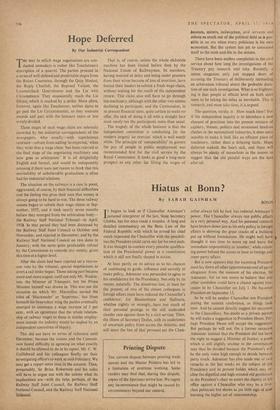Hope Deferred
By Our Industrial Correspondent 'TINE way in which wage negotiations are con- " ducted nowadays is rather like Touchstone's description of a quarrel. The parties proceed in a series of well-defined and predictable stages from the Retort Courteous, through the Quip Modest, the Reply Churlish, the Reproof Valiant, the Countercheck Quarrelsome and the Lie with Circumstance. They occasionally reach the Lie Direct, which is marked by a strike. More often, however, again like Touchstone, neither dares to go past the Lie Circumstantial, so they measure swords and part with the honours more or less evenly divided.
These stages of each wage, claim are solemnly recorded by the industrial correspondents of the newspapers, who usually—with superhuman restraint—refrain from adding 'as expected,' when they write that a wage claim 'has been rejected at the final stage of the negotiating machinery and now goes to arbitration.' It is all delightfully. English and formal, and would be indisputably amusing if there were not reason to think that this inevitability of unbelievable gradualness is often bad for industrial relations.
The situation on the railways is a case in point, aggravated, of course, by their financial difficulties and the feeling this gives their men that money is always going to be hard to win. The three railway unions began to submit their wage claims in Sep- tember, 1957, and it took nearly seven months before they emerged from the arbitration body— the Railway Staff National Tribunal—in April, 1958. In that period they had been discussed by the Railway Staff Joint Council in October and November, and rejected in December; and by the Railway Staff National Council on two dates in January, with the same quite predictable refusal by the Commission to concede any money, given this time at a higher level.
After the claim had been rejected on a two-to- one vote by the tribunal, special negotiations to avert a rail strike began. Those taking part became more and more august, until not only Mr. Watkin- son, the Minister of Transport, but the Prime Minister himself was drawn in, This was not the occasion on which Mr. Macmillan earned the titles of `Macwonder' or `Supermac; but from beneath his benevolent wing the parties eventually emerged to announce a wage increase of 3 per cent., with an agreement that the whole relation- ship of railway wages to those in similar employ- ment outside the industry would be studied by an independent committee of inquiry.
This did not have its terms of reference until December, because the unions and the Commis- sion found difficulty in agreeing on what exactly it should be allowed to do in its report. Mr. C. W. Guillebaud and his colleagues finally set their investigating officers to work in mid-February. We may get a report some time in the autumn. Then, presumably, Sir Brian Robertson and his aides will have to argue out with the unions what its implications are—with the help, perhaps, of the Railway Staff Joint Council, the Railway Staff National Council, and the Railway Staff National TribunaL That is, of course, unless the whole elaborate machine has been fouled before then by the National Union of Railwaymen. Its members, having wearied of delay and being under pressure from their wives because of loss of overtime, have forced their leaders to submit a fresh wage claim, without waiting for the result of the independent review. This claim also will have to go through the machinery, although with the other two unions declining to participate, and the Commission, in its present financial state, quite certain to make no offer, the task of doing it all with a straight face must surely tax the participants more than usual.
The tragedy of the whole business is that the independent committee is conducting (in the modern jargon) 'an exercise' which is well worth while. The principle of 'comparability' to govern the pay of people in public employment was recommended first for the civil service by the Royal Commission. It looks as good a long-term prospect as any other for lifting the wages of busmen, miners, railwaymen, civil servants and others as much out of the political field as is pos- sible in an era when every politician is his own economist. But the system has yet to commend itself to the rank-and-file in the unions.
There have been endless complaints in the civil service about how long the investigations of the Treasury pay research unit take. Recently, a union magazine only just stopped short of accusing the Treasury of deliberately misleading . an arbitration tribunal about the probable dura- tion of one such investigation. What is so frighten- ing is that people at official level on both sides seem to be taking the delay as inevitable. This is research, and must take time, it is argued.
The question, surely, is : How much time? For if the independent inquiry is to introduce a new element of precision into the present mixture of cajolery, threats, politics and occasional head-OIL clashes in the nationalised industries, it does seem sensible to make it look like an efficient piece of machinery, rather than a delaying tactic. Hope deferred maketh the heart sick, and there will always be plenty of masochists in the unions to suggest that the old painful ways are the be, ,t after all.


































 Previous page
Previous page